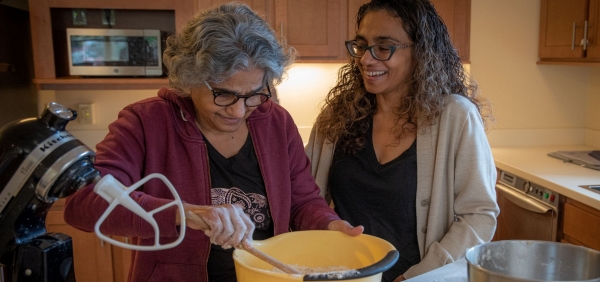Assisted Living vs. In-Home Care, How to Choose?

In-Home Care or Assisted Living: Five Things to Consider When Making Your Decision
Most older adults express a strong interest in aging at home, especially when they’re asked to compare in-home care versus assisted living in a senior living community.
If you’re an older adult who would agree with that statement, you may back it up by arguing that aging in place with at-home care is more cost-effective; that you’ll get more personalized care and attention from your in-home caregiver; that you’ll be happier and have an increased sense of well-being; and you’ll be more independent staying at home with in-home care.
But exactly what is in-home care? And even with in-home care added in, do these arguments for aging at home really stack up when objectively compared against what you get at an assisted living community? For each of these four rationales, which one truly has the advantage: assisted living or aging in place with in-home care?
First, what in-home care is.
In-home care is any type of professional support services that help you as an older adult live in your home, safely. Typically, assisted living services are provided, such as bathing, dressing, grooming, toileting, running errands, cooking and cleaning. For a set fee, in-home care agencies send a professional caregiver to your home for several hours a day or a certain number of days each week, depending on the need. In-home care may be for someone who needs help with activities of daily living, is managing a chronic illness or is recovering from a hospital stay.
And what assisted living is.
Assisted living is either part of a senior living community that also offers other levels of care, or is a stand-alone care community offering only assisted living. You select your residence from those available at the community, often some sort of private apartment with varying floor plans and square footage, and you enjoy all the services and amenities the community provides, from housekeeping and meal preparation to laundry services and interior and exterior upkeep. Staff members offer assistance with the activities of daily living, as well as help with medication management and 24/7 nursing care.
A head-to-head comparison of the four rationales
- Cost-effectiveness.
Costs vary depending on the state you live in, but according to a Cost of Care Survey by Genworth, the average cost of a home health aide in 2020 was $24 an hour. The same study reported that the median yearly cost in 2020 for in-home care was $54,912. That breaks down to $4,576 every month for in-home care.
But wait: That’s not even including the cost of what else you pay to stay in your house. If you still have a mortgage there’s your mortgage payment, plus utilities, property taxes, home maintenance, groceries — just these bills can be tens of thousands of dollars. Don’t forget the price tag for modifying your home to address functional challenges, like grab bars in the bathrooms, door handles instead of door knobs, even wider door frames to accommodate a wheelchair.
At an assisted living community, Genworth found the monthly median costs for assisted living nationally were $4,300. That’s $51,600 annually. Except as a resident at an assisted living community, that’s essentially all you pay — and for that you get your residence, assisted living services and care provided by licensed healthcare professionals, access to a number of services, amenities and activities, and more. In addition, these communities are designed to increase adults’ mobility, promote independence and reduce serious issues like falls. So bathrooms have grab bars, apartments have emergency call buttons and flooring may be specially designed to reduce falls.
Advantage: Assisted living
- Personalized care and attention.
With in-home care, you do receive one-to-one attention from your professional caregiver. Yet, you have only one caregiver. There’s no one else to check on you if your in-home care professional overlooks an issue or is negligent with providing thorough care. And not all in-home care agencies strive to send you the same caregiver for each visit, so you have to build rapport and trust with each new person. You also don’t have access to 24/7 care and access to a larger team of healthcare professionals who know your health situation, unique needs and personal preferences. An assisted living community like Artis Senior Living would offer 24/7 care, and a staff of medical providers who treat you as a person, not a patient.
Advantage: Assisted living
- Happiness and well-being.
Social isolation and loneliness are linked to serious health conditions. You may think, but with in-home care I’ll have someone visiting me every day! Yet even with an in-home care professional at your home a few hours each day, you may spend the majority of your hours alone, with no access to friends, neighbors or loved ones. You may not be able to drive to a senior center for classes or to church for services, which provide valuable social connection.
If you live in an assisted living community, however, you’d have like-minded neighbors just outside your door who share many things in common with you. You’d have a calendar of activities and events to participate in and enjoy, whenever you feel like it. And
Advantage: Assisted living
- Independence.
You may actually find it more difficult to regain, maintain or improve your independence at home, even with in-home care. That’s because not all in-home agencies work with your doctor to create a personalized care plan created for your unique needs. This is especially important if you have a chronic condition or if you’re recovering from an illness or injury.
People who live at an assisted living community often say they became much more independent once they moved in. They had access to wellness programs, superb health care provided by highly trained, compassionate staff, ate regular nutritious and delicious meals, met and became friends with their fellow residents, found purposeful ways to enjoy their days and got back their zest for life.
The bottom line: Aging at home vs. assisted living
So which one wins here? We’ll let you be the judge. Because in the end it’s not about which one emerges the winner — it’s which one is the best fit for you and your unique situation. And even though we compared four rationales, everyone’s needs, wants, expectations (and reasons) are different.
Get to know the advantages of assisted living at Artis Senior Living of Lakeview or contact us.



